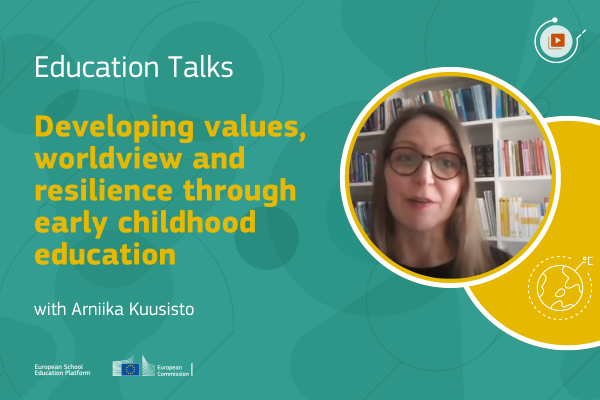Education Talks: Developing values, worldview and resilience through early childhood education

My name is Arniika Kuusisto, I am professor in early childhood education at the University of Helsinki, in Finland.
By values we mean the matters that are important and valuable to us. Values are learned by making careful observations about the micro messages people around us give in social interaction. For example, the facial expressions and body language, but also the ways in which people around us act and react. Also, values are this kind of Lego bricks that construct the individual worldview.
So worldview is a kind of life philosophy or the glasses through which we see the world around us and make our interpretations about what happens in the world.
Values can sometimes be so important to people that they are also willing to put a lot of effort into defending these. For example, climate anxiety can make children want to actively strive for sustainability, thereby creating hope, agency and positive acts of change.
Here the children observe the ways in which other people, such as parents, teachers, and also older siblings and peers, treat other people. When the adults around us treat other people respectfully and speak positively about them, also behind their back, children learn to respect and trust others.
This is also important for their own wellbeing in preschool, for example, because when the child sees that the parents trust and respect the preschool staff, they can also feel more trustful, from the onset, with this kind of new people.
When teachers and parents are equally respectful towards all genders, for example, and speak positively about everyone’s equal opportunities in life, whatever their gender, ethnicity, religion or worldview, for example, then the children learn the values of equality and inclusivity.
It is very important that teachers constantly strive towards making early childhood education an identity-safe space. It is very important that every child can feel respected, recognised, seen and heard in early childhood education every day. And when they get the experience of empathy, compassion and respect towards them, they can also learn to give similar appreciation to others.
These values can also be taught - for example, through reading books and telling stories, doing drama, music and art with children, because the stories and narratives help children to learn from and understand different roles and positions (for example, fairy tales), while also learning empathy.
Being seen and heard every day is of great importance in supporting every child’s resilience to adversities in life. That is important not only for supporting the children’s learning and wellbeing, but also for the situations where something does happen, for example a loss or a divorce in the family. If a trustful, respectful relationship has been established and maintained, the child can also feel that they can turn to the teacher with their sorrows and anxieties and get support when needed.
Another important support factor for resilience is the peer-level relationships, so friendships between children. Teachers need to be sensitively attuned to exclusion and loneliness in the group and do their best to support every child so that they can become an appreciated peer and have friends to play with.
Solving conflicts between children is also a lot easier when the operational culture of early childhood education has been continuously constructed as a safe space, also for respecting everyone’s opinions. But the teacher can explain, for example, when discussing a story or some other topic that people don’t have to agree on everything, but that everyone has a right to their own opinions.
However, learning to respect the diversity of views is also important here. When discussing the difference of opinions and values with children, it is also important to make the point that although people can think differently, there are some limits to what is right and wrong, for example by law or human rights, and the Convention of the Rights of the Child. They also give the frame of reference to what is acceptable and what is not.
This is again one reason for supporting every child and their connectedness to the group and feeling of being included and respected just the way they are every day of the early childhood education.
Further reading
Additional information
-
Education type:Early Childhood Education and Care
-
Target audience:TeacherStudent TeacherHead Teacher / PrincipalTeacher EducatorParent / Guardian
-
Target audience ISCED:Early childhood education (ISCED 0)
